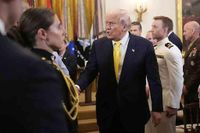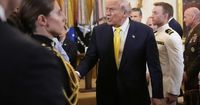On August 7, 2025, the East Room of the White House filled with nearly one hundred Purple Heart recipients and their families, all gathered to mark National Purple Heart Day. President Donald Trump, standing at the podium, addressed the room with a mixture of gratitude and self-reflection, his words echoing through a space steeped in the history of American sacrifice. Yet, as the ceremony unfolded, it became clear that the event would not only celebrate the valor of wounded veterans but also stir controversy over the president’s own relationship with military service and the meaning of honor.
National Purple Heart Day, observed annually on August 7, honors members of the U.S. military who have been wounded or killed in action. According to the National Purple Heart Hall of Honor, more than 1.8 million of these medals have been awarded since the distinction’s inception in 1782. The Purple Heart holds a unique place in American military tradition, symbolizing the cost of service and the resilience of those who bear its mark.
This year’s ceremony, as reported by the Associated Press and other outlets, carried an added layer of significance. Three veterans—Thomas, John Ford, and Gerald Enter Jr.—who had given President Trump their own Purple Heart medals in the aftermath of an assassination attempt at a campaign rally in Butler, Pennsylvania, in July 2024, were present. During that rally, a bullet struck the top of Trump’s right ear, just days before the Republican National Convention. The incident, which could have turned tragic, instead became a defining moment of the campaign and led to an outpouring of support from some in the veteran community.
“Last year, after an assassin tried to take my life in Butler, Pennsylvania, Thomas generously mailed me one of his Purple Hearts. Many of the other veterans showed me the same unbelievable gesture of kindness, including three-time Purple Heart recipient John Ford and Gerald Enter Jr., who also came along with us and did us a great, great favor,” Trump said, according to BBC and AP coverage. He continued, “Gerald, John, and Thomas, I want to thank you very much. What a great honor to get those Purple Hearts.”
Yet, it was Trump’s next remark that drew the most attention. “I guess in a certain way, it wasn’t that easy for me, either, when you think of it. But you went through a lot more than I did, and I appreciate it all very much.” The president’s attempt to draw a parallel between his own experience and the sacrifices of wounded veterans landed uneasily with some observers. Critics quickly pointed out Trump’s history: a bone spur diagnosis in 1968 that exempted him from military service during the Vietnam War, a series of reported comments disparaging deceased soldiers as “suckers” and “losers,” and his past requests to keep wounded veterans out of military parades.
According to The Guardian and Washington Post, these past actions have long fueled skepticism about Trump’s genuine respect for the military. During his first term, he also refused to visit a World War II graveyard in France, and at one point, he claimed that the Presidential Medal of Freedom he awarded to a billionaire donor was “much better” than the Medal of Honor, the nation’s highest military distinction. These incidents have continued to shadow his public appearances with veterans, even as he seeks to position himself as a champion of the armed forces.
Still, the ceremony was not without its moments of solemnity and genuine recognition. Trump offered “everlasting thanks to you and your unbelievable families,” acknowledging the sacrifices made not just by the recipients but by their loved ones as well. Defense Secretary Pete Hegseth, Veterans Affairs Secretary Doug Collins, and Gen. Dan Caine, chairman of the Joint Chiefs of Staff, joined the president on stage. Chris LaCivita, a Marine veteran and Purple Heart recipient who also served as Trump’s campaign co-manager, was among those recognized.
In an effort to highlight the valor of the recipients, Trump recounted the story of Army Specialist Kevin Jensen. In 2008, Jensen’s Humvee was hit by a roadside bomb in Afghanistan. Despite suffering deep, third-degree burns, Jensen ran through flames to rescue his platoon leader, Captain Sam Brown, himself a Purple Heart recipient. “He flew 10 feet up in the air, exploded in flames. The whole place was in flames, including, unfortunately, Kevin,” Trump said. “He suffered deep, third-degree burns all over his body. He was in trouble, big trouble. Despite the agony, he selflessly ran to the aid of his platoon leader.”
The president also used the occasion to tout his own record on national security, referencing his authorization of the 2020 U.S. drone strike that killed Iranian General Qassem Soleimani. Trump derided Soleimani as the “father of the roadside bomb,” quipping, “Where is he? Where is he?” to laughter from the assembled crowd, as reported by the Associated Press.
Yet, even as the president sought to align himself with the courage and sacrifice of Purple Heart recipients, the underlying tensions were hard to ignore. The gifting of the medals, while a gesture of respect from the veterans involved, stood in stark contrast to Trump’s earlier attitudes toward military service and the traditions of the armed forces. For some, the ceremony was a meaningful moment of unity and gratitude. For others, it felt like an uncomfortable attempt to rewrite a complicated legacy.
Throughout the event, the symbolism of the Purple Heart loomed large. Established by George Washington in 1782, the medal has come to represent not just the wounds of war but the enduring spirit of those who serve. As President Trump posed for photos and exchanged words with the recipients, the ceremony became a microcosm of the broader debates about patriotism, sacrifice, and leadership that continue to shape American politics.
Whether the day will be remembered as a heartfelt tribute or as another flashpoint in the ongoing discussion about Trump’s relationship with the military remains to be seen. But for the veterans in attendance, and for the millions who have received the Purple Heart over the centuries, the meaning of the medal endures—far beyond the headlines, the politics, or the controversies of any single day.


